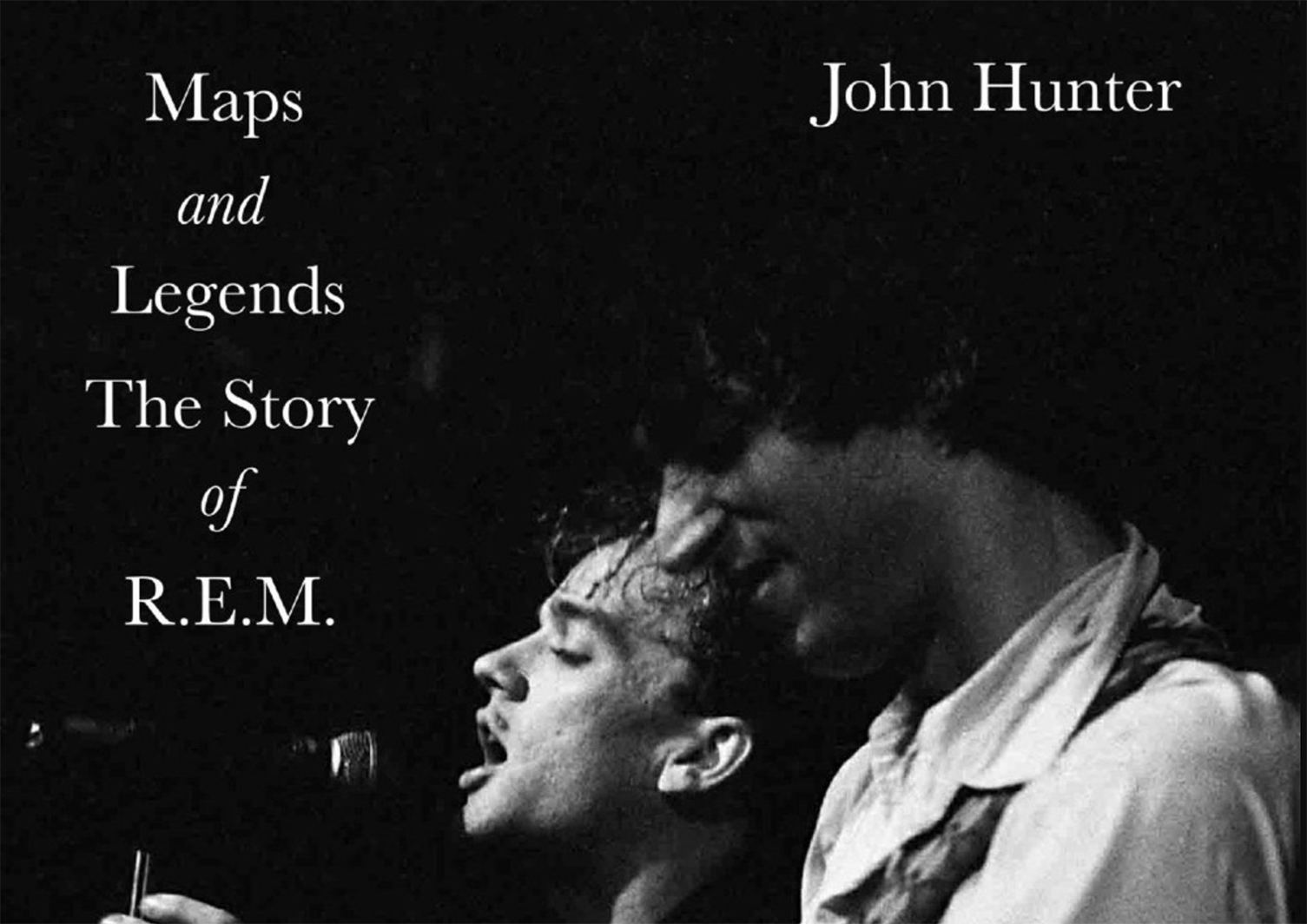Maps and Legends: The Story of R.E.M.
Book review and interview with author John Hunter
They once got called the Righteous Brothers, while another writer referred to them as something that crawled from the South. At one point R.E.M. even got tagged as “America’s Best Rock and Roll band,” which at various points on the continuum was definitely true. Now, when there’s no chance of a reunion (according to guitarist Peter Buck…), we’re left with exactly what we deserve – the records, the fading memories of how great they were live and books like John Hunter’s hefty “Maps and Legends” bio.
In terms of transparency, let’s just say right up front that living here in the 706 area code and reading (or writing…) about R.E.M. is an odd proposition. Names and places that crop up across these 693 pages are very familiar, and in some cases, personal acquaintances. That aside, there’s so much more that we didn’t know having arrived way after the days at Tyrone’s, the era of the breakthrough records, and the famous videos that caught them in amber. The retina of Athens, GA was already beginning to detach when we arrived in 1993, and not only were the band more and more scarce locally, many of the landmarks chronicled here had already been erased or co-opted into new ventures.
The abandoned church steeple that played host to their first gig however remains, and Hunter spares no grimy nuance in rendering how it went down in April 1980. The indie crowd back then pulled its fair share of Fellini moves before reporters began to descend on the streets of the “Classic City.” That period in the band’s career, where they played easy covers at hyperspeed for beer money, is one of the more fascinating parts of this story. Opinions oscillate wildly as to how good they were or weren’t, but the surviving bootlegs bear out the text’s version of the amphetamine thrill they projected from the stage. Just one listen to the unreleased “Nervous Breakdown” from October 1980 can confirm that.
Further on, we get R.E.M. doing whatever they can to back away from stardom and cope with their material worth. At various points we hear Peter Buck say they could write something like “Driver 8” every day of the week and learn just how wrecked Michael Stipe was “in every possible way,” just as the spotlight on their career began to intensify in 1984. Hunter tells their story, the familiar bits and the superfan moments without any fanciful imprint – capturing the magic (like Peter Buck stumbling on the parts for “Losing My Religion”) and the mundane (ticket prices, studio doldrums, and contracts…) on equal footing.
But despite being a lifelong fan, the author is careful to offset the anecdotes of their many triumphs with the trials of what it took to keep the ship aright. The success that engulfed them, came with all its attendant snags. Drugs, drink, and a band member that finally left the movie for a quieter life, however, didn’t stop them from a host of creative highs until the time that they breathed their last. Hunter also makes sure to capture the dimmer corners of their history including late career gems like “Oh My Heart” from Collapse Into Now, and the lesser known Peter Buck solo records that were released on vinyl only.
A good five years was spent pulling “Maps and Legends” together, much of it during the pandemic. And while Hunter never really worked with anyone within the band’s inner circle, the 200-plus pages of reference materials he’s put on display in the book’s back matter attest to the amount of legitimate homework he put into the project. As a first-time author the work is sound and at many points you do get the sense of being there. On balance, however, there are moments when the need to get further along on their timeline, results in the narrative getting a bit rushed and the feeling that the vibe of a particular moment could have been sustained longer.
Which is something that could also be said about the weirder side of the South that R.E.M. came to represent. While it’s certainly not gone, it feels as if its artistically in deep retreat. The city that spawned them has changed dramatically as well. The Athens that many bands would not have skipped while out on the road, is now often sidestepped when it comes to booking tours. The venues are here but the impulse to turn up at your local rock and roll dive to drink and see whoever was coming through town has in many ways vanished. But these things are cyclical. Because even if the quiet college town that could seems to be sinking into the mire of over-development, there’s always great new music being made here whether the world is aware of it or not.
But until the next big flourish hits, Hunter’s book reminds us that not only were R.E.M. great, but that they moved the needle in a big way. And they did it at just the right time.
///
TRACKING ANGLE INTERVIEW WITH JOHN HUNTER
Tracking Angle: How did you decide on tackling R.E.M.’s story as your first book?
John Hunter: I was an English major when I was at the University of Georgia (in Athens) and you know I played in a band there for three or four years and did all that in the 80s. When I was a teenager I discovered REM and the Replacements and Husker Du and I was like ‘Wow this is as exciting as the 60s and you can go see these bands in a theater or a club even!’ So I got swept up into all that.
TA: What was the biggest hurdle to putting this all together?
JH: I got (manager) Bertis Downs phone number (and) I guess this would have been in 2018. I was surprised that Bertis took my call, but we spoke for about 15 minutes and I said you know ‘Hey I'm a first-time author I'm writing this book I was wondering if any of the guys in the band would be interested in talking to me.’ And Bertis politely said they're through talking to biographers. I'm sure he gets bombarded with calls (and) you know I've never written a book. It's not like I was some Peter Guralnick's calling him up to say I want to write a book, so I didn't get to speak to the band members.
TA: Were there any particularly surprising things that revealed themselves to you while you were doing all this research?
JH: The thing that surprised me the most is that I didn't really understand how close it all came to falling apart in ‘81 and ‘82 between “Radio Free Europe” and the “Chronic Town” EP. My take on it is that there was a period where Pylon was probably the safer bet to make it out of Athens or maybe even Love Tractor. When they were struggling to put out this self-released EP, if you really go back and look at the way their career was going then it was all hanging in the balance.
TA: Did working on this project fundamentally change the way you thought about their music?
JH: I think if you get to the last page you'll see it concludes on a pretty high note. I never would have written the book If I didn't fundamentally love them, but yeah it's made it harder for me to listen to their records for pleasure. I think Reckoning will always be my favorite record but I don't know if I ever in the foreseeable future want to listen to Monster again. But the one song called “Oh My Heart” from the Collapse Into Now sessions that I write about later in the book, which is interesting to me because number one it's just a fantastic song, but it was credited to Buck Mill Stipe and (touring guitarist) Scott McCaughey. At the very end of their career they let somebody in the inner circle so that they had a four-way co-write again. It's kind of this mandolin ballad and but that song to me is as good as (anything) that’s on Automatic For The People.







































.png)








